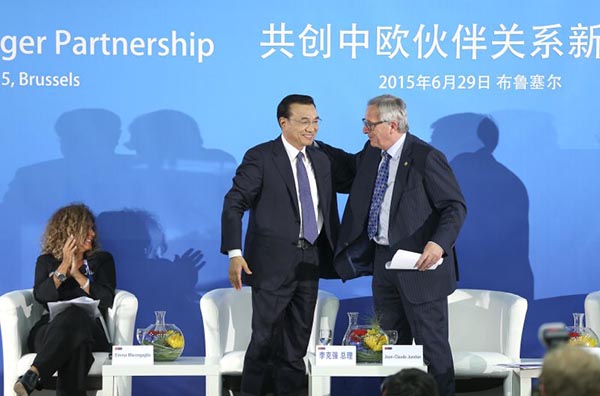Opportunity knocks for EU and China over next five years
Updated: 2015-10-12 10:29
By Fu Jing(China Daily)
|
|||||||||
 |
|
European Commission President Jean-Claude Juncker greets Chinese Premier Li Keqiang at an EU-China business summit in Brussels, June 29, 2015. [Photo/Agencies] |
This month, President Xi Jinping has two priorities on his schedule, one at home and one overseas.
First at home, he will join China’s other top decision-makers in a plenary session of the Central Committee of the Communist Party of China, which is expected to roll out a draft of the development program for 2016 to 2020. This, it is believed, will mainly aim to give a final push so China’s per capita income doubles from its 2010 level by 2020.
And abroad, after his September state visit to the United States, Xi is due pay a visit to the United Kingdom, during which he is likely to further explain to the world how China intends to play its due role as global stakeholder.
Xi will also likely outline the opportunities China’s new five-year plan offers the UK, Europe and the rest of the world.
With China deepening its efforts to restructure its economy, the Europe Union and China are becoming increasingly interlinked in trade, investment and people flows, due to their natural complementary as a result of their differing development stages.
In fact, this may produce a second wave of growth after the first wave brought about by China’s accession to the World Trade Organization in 2001.
In that year, the bilateral trade volume was $76.6 billion. It had soared to $615 billion by the end of 2014.
The coming five years offer a golden opportunity for China and the European Union to solidify the foundations of their bilateral partnership, if both sides demonstrate enough vision and determination to push forward the existing momentum.
That is to say, China’s accession to the WTO was the incentive for China and the EU to deepen their trade and economic relationship. Now, Beijing and Brussels have realized the urgency of injecting new momentum into their relations after taking advantage of the WTO dividend for years.
The two sides have decided to speed up their bilateral investment talks and will try to finalize the text for negotiations by the end this year. They have signed a memorandum of understanding that makes China the first foreign country to join the European Union’s 315 billion euro Investment Scheme, and Brussels has shown its intention to get a piece of the pie that China’s Belt and Road Initiative is creating. An EU-China fund may also be in the works.
More importantly, many European Union countries have become founding members of the Beijing-led Asian Infrastructure Investment Bank, despite Washington’s disapproval.
To sum up, on top of their already active economic and trade activities, a bilateral investment pact, a joint government-led fund and a new international financial institute are set to be three crucial important institutional arrangements between China and the EU in the coming five years.
The bilateral investment pact and a joint fund to facilitate investment into each other’s mega programs still take time to realize. But most likely, the three important arrangements can all be put into operation by 2020.
And Brussels and Beijing can do more.
Both sides should show more ambition and vision and announce their agenda for starting free trade talks soon. China and the EU account for a population of nearly 1.9 billion people and about one-third of the global economy, which are telling statistics showing the potential if the market barriers between them were to be removed.
Europe is still mired in economic difficulties as a result of the global financial crisis, and the euro’s fate still hangs in the balance to some degree. China too has been experiencing an economic slowdown.
Therefore, the leaders of both sides should lay solid institutional foundations for achieving common prosperity, they should not risk letting the opportunities of the coming five years slip through their hands. That will be benefit both sides, not only by 2020, but beyond.
Related Stories
China and EU to resume investment talks 2015-10-08 10:39
EU, China sign key partnership on 5G 2015-09-28 21:35
EU seeks ways to team up with China investors 2015-09-28 07:56
China, EU and 5G: Internet of the future 2015-09-28 07:46
Today's Top News
Inspectors to cover all of military
Britons embrace 'Super Thursday' elections
Campaign spreads Chinese cooking in the UK
Trump to aim all guns at Hillary Clinton
Labour set to take London after bitter campaign
Labour candidate favourite for London mayor
Fossil footprints bring dinosaurs to life
Buffett optimistic on China's economic transition
Hot Topics
Lunar probe , China growth forecasts, Emission rules get tougher, China seen through 'colored lens', International board,
Editor's Picks

|

|

|

|

|

|







